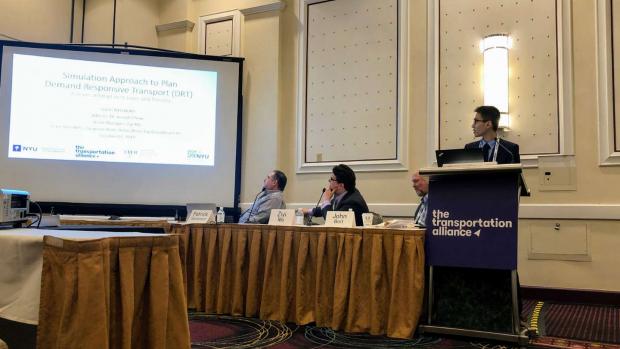NYU BUILT Lab Team wins microtransit hack-a-thon

Ziyi Ma presenting NYU BUILT Lab's winning solution at Mobilize on October 17.
From September 13 through September 18, the International Association of Transportation Regulators (IATR) conducted the first “Micro-Transit Hack-A-Thon” to address the growth from public to private transportation and promote potential microtransit solutions that provide small-scale and on-demand public transit services. Native New Yorkers who experience daily problems with commuting, Ziyi Ma, Gyugeun Yoon, Yueshuai (Brian) He and Jinkai Zhou, a team formed from members of NYU’s Behavioral Urban Informatics, Logistics, and Transport Laboratory (BUILT Lab, which is affiliated with Connected Cities with Smart Transportation), participated in and won the hack-a-thon and presented their findings at Mobilize 2019 on the morning of October 17 in Las Vegas.
Seeking solutions for 2 cities, St. Louis and Toronto, competitors utilized data sets provided to propose opportunities in microtransit routes for fleets, attempting to create solutions that improve equality in transportation for passengers with disabilities, offer acceptable wait times of five minutes or less and that make economic sense for three key stakeholders: the passenger, the driver and the fleet (groups of motor vehicles owned by a business, government agency or other organization).
The BUILT Lab’s solutions involved implementing door-to-door service (DTD) and stop-to-stop service (STS), and codes based on MATLAB and MATSim with Demand Responsive Transport (DRT) module, respectively. DTD transport is a service in which an automotive transport company picks up and delivers customers as close to the specified locations as possible, while STS transport involves picking up and dropping off passengers at predesignated stops, such as existing bus and subway stops. Out of the scenarios tested, the team concluded that only the STS Service was feasible in Toronto based on lower operational costs compared to the revenue of the drivers.
Throughout the process, NYU Built Lab found that the greatest challenge they were faced with was the wait time design requirement, as placing five-minute wait time constraint on passengers was proven unrealistic. Based on their findings, they found that the DTD Service in both cities would be in deficit without subsidies, and the sparse demand for transportation in suburban areas decreases the system performance. They concluded with recommending for a longer wait time to achieve better financial status and the provision of subsidies to drivers for infeasible cases. They also suggested the requirement of users to request rides at least one day before riding for optimal route planning, as planned ride sharing is significantly easier and more cost effective than dynamic ride sharing.
While the first microtransit hack-a-thon occurred this past fall, hack-a-thons involving software development have been around for many years, which previous C2Smart members have also competed in and won. When asked about the feeling of continuing this legacy of C2Smart and NYU Built Lab, master's candidate and leader of the team Ziyi Ma responded with great humility yet had confidence in extending the win streak.
“As New Yorkers who work in Brooklyn, we experience and understand the struggles of daily commuting,” Ma said. “Our mission is to help solve the broader problems that transportation can cause.”
Anna De La Rosa
BS, Media, Culture, and Communication
Class of 2021




